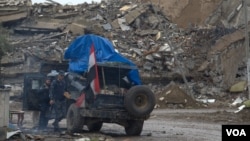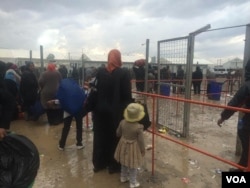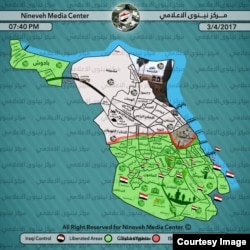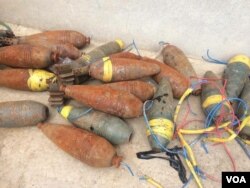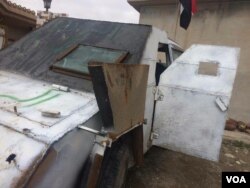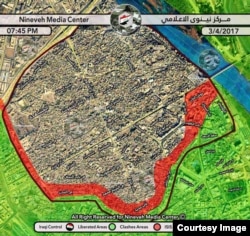A few hours after 20-year-old Zeena escaped Islamic State militants in Mosul on Monday, she is at a makeshift bus station where fleeing Mosul residents gather to be assigned tents or catch buses to relatives' homes. As it starts to rain, Zeena says she and her family are among the lucky ones.
When militants caught women attempting to flee a few days ago, she says, female IS guards arrested them and took their money and gold. But as Iraqi forces get closer to defeating the militants, violence has escalated and whole families are being executed.
Parts of Mosul still held by IS are defended by the most fanatic and best-trained among the extremist group, say soldiers. And families fleeing say civilians are trapped in a death grip.
Ali, a 21-year-old father of one that fled IS-militants late Sunday, stands nearby. "My brother just called me from our neighborhood," he says, "IS caught 30 people after we fled last night and killed them. They hung some of the bodies on the bridge as a warning to others that want to run."
Ali's bare feet sink into the mud. "One of my shoes got stuck while I was running, so I left them," he explains, shrugging.
Families, says Ali, are now left with terrible choices. If you run from IS, you may be executed. If you stay, you will certainly be used as a human shield and could die in the Iraqi and coalition offensive. If you survive the offensive, IS militants may kill you in counterattacks as they hurl mortars, sniper fire and suicide bombers into Iraqi-controlled neighborhoods.
And if the war continues much longer, he says, already hungry families in the battle zones could starve.
"They are burning our identification cards and stealing our money," he adds. "There is no transportation, so we are burying bodies in our yards."
Current battle
During the past week, the war in Mosul has become notably less accessible, with journalists banned from some areas, and granted limited access to others.
But soldiers fighting on the frontlines say they are still moving forward, albeit slowly, into Mosul's Old City, one of the most complicated battles they have faced, and toward the final fourth of the city.
"IS militants are surrounded and they are fighting with everything they have," says Captain Mohammad Sadeek, of the Golden Division's Diwaniya Battalion stationed on the frontlines in New Mosul, where hundreds of civilians have been killed in airstrikes in recent weeks. "It's their last area and they want to hold it or die."
The number of foreign fighters on the frontlines has increased notably, Sadeek adds, saying he's recently seen bodies of fighters that appeared to be Russian or Chinese.
Foreign IS militants may be better trained and better armed, adds Captain Raad Qasim of the Golden Division's Najaf Battalion, also stationed on the frontlines, but those are not the only reasons they are more dangerous in battle.
"The foreign fighters are stuck," he explains. "Locals may be able to escape and blend back into society, but foreigners have no choice but to fight to the death."
Additionally, say soldiers and civilians, foreign fighters in general tend to be more fanatic, as 100 percent of them gave up their homeland and families for IS ideology.
"We are fighting in really close quarters," says Qasim. "Sometimes we enter a house, clear it, and suicide bombers follow us inside."
These close quarters are slowing the battle as soldiers work to protect civilian "human shields," adds Sabah Numan, the spokesman for Iraqi Counterterrorism Services in Baghad. "The enemy knows there is no place to withdraw."
Battles to come
Close-quarter fighting will continue, and become more difficult as Iraqi forces move forward, says Sadeek. Some of IS's last areas are as crowded as the Old City, with streets too narrow for tanks.
These areas may be even more difficult to navigate, he adds, because they are unplanned and unorganized, with unlimited places to hide. "But they can't get any more ammunition," he continues optimistically. "They are surrounded."
For months, IS militants have been pushing civilians into this section of Mosul, most notably neighborhoods called Tamouz 17, which is thought to be the heart of IS support, and Tenek, which locals say could be a point of focus because it is near a large IS bomb and weapon production area.
Families fear the battles in these areas will result in unprecedented IS violence toward civilians, despite military efforts to protect them.
When IS first came to Tenek, explains Mohammad Khalid, a 27-year-old father of three from the area, many residents joined the group. New IS members treated former friends and neighbors as strangers, to be punished like everyone else if IS rules were broken.
In Tenek, like elsewhere in Mosul, IS became increasingly unpopular and eventually loathed as the group became more violent and strict. "At the beginning, some people thought they were a real Islamic group," Khalid explains.
As the rain subsides, Zeena and her friends prepare to board a bus to Iraqi-controlled eastern Mosul, where bombs are less frequent and students are back in class.
Zeena removes the black veil covering not her face, but a box in her hand. She escaped with her green parakeet, Mimi. "She has a soul," Zeena explains. "We have lost so much and we wanted to save her."




